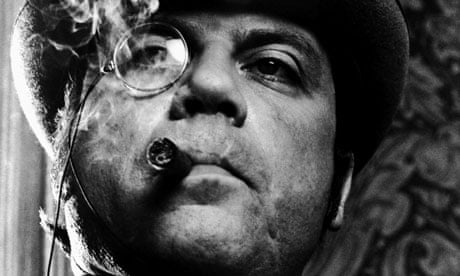Oliver Reed began his film acting career through friends he made from drinking in pubs, and has died at the age of 61 while out drinking with friends in Valetta, Malta. But while in front of the camera, he was a professional whose distinctive looks and fine speaking voice made him a striking presence in more than 90 films.
Born in Wimbledon, south London, to warring parents, he knew about trouble from the outset, and was sent away to boarding school - the first of 14 - at the age of four. From the schools, he learnt to look after himself, and from his mother and the holiday nannies arranged by his army officer father he learnt to be indulged by women. At his final school, Ewel Castle, he was captain of athletics.
National service took him along the same path as his father (though he served in the medical corps), and he would happily have continued the military life but for the obstacle of dyslexia. Drinking in Earl's Court gave him the idea of following his friends into becoming a film extra, and his breakthrough came with a children's television serial called Golden Spur.
Among the lower decks, lower ranks and lower orders in British films around the join of the 1950s and 1960s, you can spot many blokes, the Conneries and the Caines, who shortly after metamorphosed into heroes - officers, if never exactly gentlemen. You may also notice briefly the young Reed, whose personal ineptitudes - the booze, the weight, the consistently shot-off mouth - cured him into a particularly thick-skinned ham, and did for what might have been a more interesting movie career.
In thick set of muscle, growling voice and manner, he was a type generally more useful to a Hollywood casting agency than to British cinema of the time - the young heavy; but that scowl won him his first lead role in a Hammer horror of ritual creakiness, The Curse Of The Werewolf. But physicality, and rough trade at that, not the fake-elegant tapping the cigarette on the monogrammed case sort, was then rare in a British actor, and Reed had enough of it to interest Ken Russell, who had begun his series of television biographies of musicians and artists: 'He struck me as vivacious, cheeky and not run-of-the-mill,' said Russell. 'He came to see me and looked terrific. I remember him being very moody and glowering. I liked his spirit - everyone else seemed to fade into insignificance.'
So in 1963, Reed was cast in the TV Debussy life; and later Russell used his lubberliness, and willingness to expose himself in every possible way, in his 1969 feature film Women In Love (in which Reed was rather more like Seth Starkadder in Cold Comfort Farm, undoing another button of his shirt, than DH Lawrence's Gerald Crich); and, better, as Urbain Grandier in The Devils (1971). Reed's voice was excellent at this period, with considerable control; it would have sounded well in Jacobean tragedy.
He was in two of the more lumbering caper films of the 1960s, Michael Winner's Hannibal Brooks (1968), as a prisoner-of-war escaping - appropriately by elephant - and Basil Dearden's lumpen 1968 The Assassination Bureau, in which he attempted (unconvincingly) to be seductively charming to Diana Rigg. His Bill Sikes, in the 1968 musical Oliver!, was powerful - it was all in the hunch of the shoulders - and he brought off a coolly sinister smoothie in Anatole Litvak's 1970 threatened-woman thriller, The Lady In The Car.
But he was already making duff choices, and after the early 1970s, was infrequently in respectable movies. Though his Athos, in Richard Lester's The Three Musketeers (1973), genuinely suggested a considerable leader with a dark past; certainly nobody ever practised with more gusto fight director William Hobbs's style of duelling dirtily with sword (or boot to groin) when the opponent was distracted. After that, it was film after film in Italy or France or worse, although just occasionally even into the 1990s Reed might be glimpsed - for instance in the 1993 television sequel to Lonesome Dove - heftily suggesting a mis-spent life.
Throughout his career, Reed had a great love of drinking in pubs and the camaraderie - always liable to spill over into fighting - that went with it. The press offered him every encouragement, so that, as he despairingly put it, 'People want you to be a hellraiser.'
His 10-year marriage to the Irish model Kate Byrne produced his son Mark, but came to an end in 1970. He also had a daughter, Sarah, from an overlapping long relationship with a ballet dancer, Jacquie Daryl. However, in 1985 he married Josephine Burge, then 21, but his companion since she was 16, and found a measure of peace.
Robert Oliver Reed, actor, born February 13, 1938; died May 2, 1999
